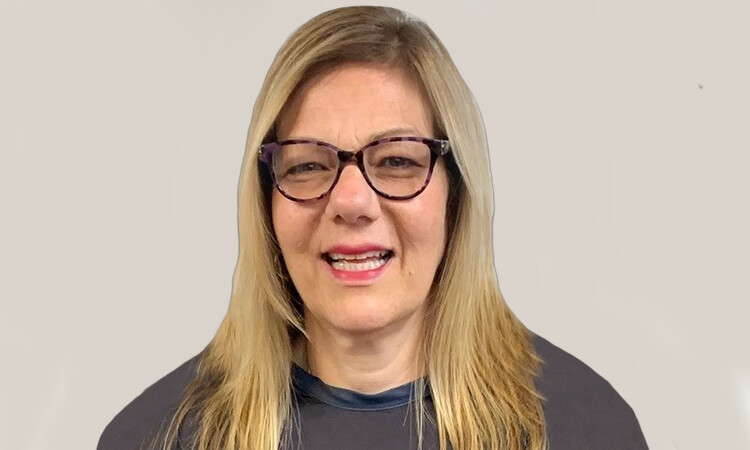‘Only through God’s love and grace’: A post-abortion journey of faith and redemption
When Cheryl Riley was 19, her boyfriend pressured her to have an abortion. What followed were years of Riley self-medicating her trauma with drugs and alcohol before finally finding genuine healing on a retreat with the Catholic Church. Since then, and for the past 25 years, Riley has shared her powerful message of post-abortion hope, renewal and faith.
“There needs to be healing before we can convert people’s hearts,” said Riley, director of the Respect Life Office at the Archdiocese of Newark. “So many have been affected by abortion.”
“Abortion is a trauma, and we can’t go through a trauma and just return to normal life and be okay. It doesn’t work that way. People need to know there can be hope and healing after an abortion.”
Riley dedicates her life and vocation to teaching women and men the facts about abortion as well as God’s healing love and mercy. As a young person, she was not educated about the profound decision of abortion, nor its physical, psychological or spiritual impact.
Growing up, Riley was a faithful Catholic. She recalls that her parents never talked to her about sexuality, nor did her schoolteachers or religious education instructors. Instead, she says, she learned from her peers that it was okay to be on birth control or to have an abortion as long as it was not used as birth control.
“I thought it might happen to others, but that would never happen to me,” she said.
Riley was eight weeks pregnant when her boyfriend dropped her off at an abortion clinic. She was alone and confused. She told her parents she was going to be elsewhere that day. They had no idea of the experience that would afflict their teenage daughter for years to come.
“I wanted someone to talk to me and tell me what was going to happen,” recalled Riley.
The first interaction in the clinic was someone asking her for payment. After that, no one discussed abortion with her or asked how she felt, if she had questions, whether she was sure of it, or how she would get home.
“The medical staff didn’t even care to know my name. Not one of them asked me, ‘How are you?’ or ‘What’s your name?’ It seemed they had to get me in and out because the waiting room was filled with other pregnant girls.”
She described waking up from the anesthesia crying and bleeding. “Every cell in my body hurt,” Riley said. “They said I’d be okay in a few days, but I suffered for 12 years before I was okay.”
Following her abortion, Riley felt she no longer belonged in a church.
“I couldn’t enter a church without crying,” she said. “I was angry at God. I wondered how could He let this happen to me? Where was He? So, I pushed God out of my life.”
To cope, Riley abused alcohol and drugs and suffered from low self-esteem and suicidal thoughts. She had given up on finding peace and healing. Neither therapy, counselors, nor support groups helped. Eventually, she found healing in her faith and the Catholic Church.
“I finally went to church one Sunday morning, which I hadn’t done in a while because I didn’t think I deserved to be in a church,” she said. “And there it was in the church bulletin.”
The bulletin included a small blurb: “Are you suffering from an abortion experience?” followed by a phone number to call.
Riley called the next day. Her predecessor in the archdiocesan Respect Life Office answered the phone, spoke with her about post-abortion syndrome, and enrolled Riley in a weekly counseling program with a trained priest. She then was signed up for the first-ever archdiocesan Rachel’s Vineyard, a retreat place for women and men to reconcile painful post-abortion emotions and experience healing and renewal in a confidential and supportive environment.
“At that retreat, I said, ‘This is it. If I can’t get help here, I’ll just live with this pain forever,’” Riley recalled. “But that didn’t happen. The healing from my abortion came from that retreat and counseling.”
“Through the Rachel’s Vineyard retreat, I was able to name my child and memorialize her in a beautiful Mass and burial. She died violently the day I aborted her, but I was able to honor her and give her dignity by naming her Christina.”
Twenty-five years later, Riley continues to recount her personal story using her no-nonsense approach and straight talk. She shares her experience with parishioners and teens during visits to parishes, high schools, and even Girl Scout meetings. She increases her educational presentations during Respect Life Month in October to emphasize pro-life messages.
This October, she will jubilantly mark the silver anniversary of the Archdiocese’s launch of Rachel’s Vineyard retreats. The milestone celebration is especially poignant given the recent U.S. Supreme Court ruling on Dobbs v. Jackson Women’s Health Organization.
“The Catholic Church is here to support the healing of women and men who experience abortion and to offer support and guidance,” Riley said. “God is merciful, and it’s only through God’s love and grace that I can speak about my experience after my abortion. I asked for healing, and God answered my prayers.”
Upcoming Rachel’s Vineyard retreats are scheduled for September 9-11 in English and October 21-23 in Spanish. More information about the Archdiocese of Newark’s Respect Life Office or Rachel’s Vineyard and post-abortion healing is available online.
To learn more about Cheryl Riley’s personal journey, listen to her interview on Ave Maria Radio or watch the John Leaps Evangelization livestream.
Additional resources are available as follows:
Rachel’s Vineyard: www.rachelsvineyard.org
Silent No More: www.silentnomoreawareness.org
Help for Moms: https://njcatholic.org/help-for-moms
Catholic Charities of the Archdiocese of Newark: www.ccannj.com
New Jersey Safe Haven: www.nj.gov/njsafehaven
Featured image: A picture of Cheryl Riley, director of the Archdiocese of Newark’s Respect Life Office. (Image courtesy of Cheryl Riley/Archdiocese of Newark.)



